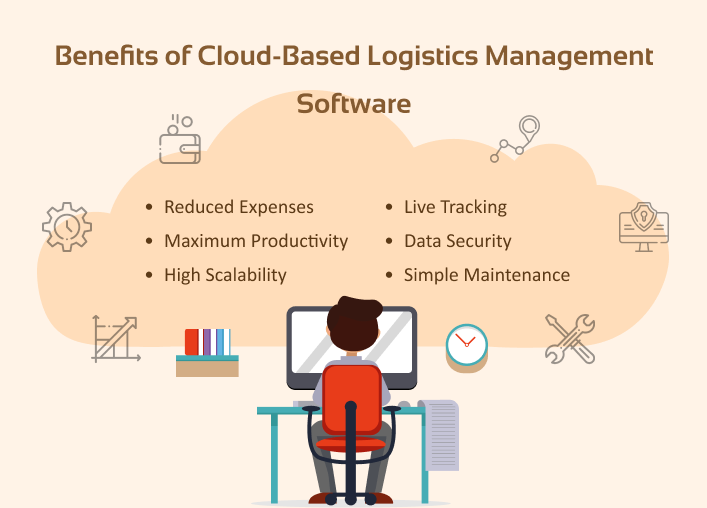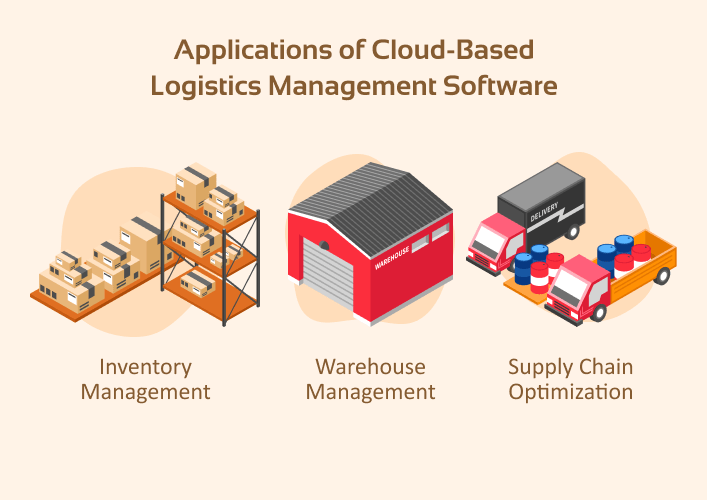Benefits of Cloud-Based Logistics Management Software

Reduced Expenses:
Significant cost reductions are one of the primary benefits of cloud computing for logistics companies. Businesses may save money on capital expenses and pay for just the resources they use. This way they can omit the purchase of costly hardware and servers. Furthermore, you can save on additional operational costs.
Maximum Productivity:
The use of cloud computing in every industry has shown a boost in output and efficiency. 59% of IT businesses have reported an increase in productivity. With cloud computing, logistics companies may access their data from any location, at any time. Furthermore, employees can work together and communicate information more easily, which helps improve workflow.
High Scalability:
The capacity to scale up quickly is a major benefit of cloud-based logistics software. Depending on demand, logistics businesses may simply expand or contract their operations. By adopting cloud analytics, logistics organizations, for instance, can precisely predict how many employees and other resources would be needed during busy and slow periods.
During busy times, they may easily bring on extra resources to deal with. In contrast, when business is sluggish, they may reduce their workload and save money. This is particularly useful for logistics firms that cater to online retailers during busy shopping periods like Black Friday and Christmas month.
Live Tracking:
Supply chains may be optimized by incorporating cloud tech into the logistics industry, which allows for live shipment tracking. Logistics firms, for instance, may employ cloud-based systems to instantly notify consumers of order location and projected arrival times. With this kind of insight, logistics firms can better serve their customers and improve customer experience.
Furthermore, transparency is increased throughout the shipping process. This way, there may come a possibility of optimizing the shipping process by reducing delivery delays.
Data Security:
Protecting private information like customer data and shipping addresses is a top priority for logistics firms. By moving your logistical operations to the cloud-based logistics management software, you can protect your data with advanced measures.
These measures include off-site backups, encryption and firewalls. Furthermore, you don’t have to worry about data breaches and important data. The cloud provider’s specialized security teams and cutting-edge threat detection technologies help in this.
Simple Maintenance:
You don’t have to worry about the maintenance of the cloud-based logistics management software. This will be taken care of by the cloud service providers. You can manage your business operations without interruption and easy updation or maintenance can be done.
Applications of Cloud-Based Logistics Management Software

The rise in popularity of cloud-based logistics software may be linked to improved operational efficiency, lower costs, and more scalability. Some applications of cloud-based logistics systems are shown below.
Inventory Management
Using cloud-based inventory management software, a logistics firm will get the benefit of real-time inventory tracking and management. In this way, the business may avoid running out of supplies and lessen the likelihood of overstocking. Furthermore, it helps in remotely tracking and providing an overview of the inventory of all the locations.
Warehouse Management
Furthermore, cloud computing has several potential applications in the logistics industry, including warehouse management. Logistics firms may manage their warehouse operations in real time with the use of cloud-based logistics software.
This includes tasks like stocking shelves, monitoring shipments, and organizing resources. Additionally, logistics firms may better manage their operations remotely due to the software’s portability.
Supply Chain Optimization
Logistics firms may oversee the whole supply chain, from the procurement of raw materials to the shipment of completed goods, with the use of cloud-based supply chain management software. Logistics firms may enhance their ability to work together with their partners, shorten delivery times, and boost overall supply chain performance.
Furthermore, the most effective routes for delivery may be determined with the use of logistics software. You can optimize routes based on real-time weather as well as traffic data. Thus, you can minimize delivery times, cut fuel costs, and boost customer satisfaction.
Conclusion
With many benefits, logistics management software is useful for inventory management, warehouse management, real-time order tracking, freight management and more. You can buy general logistics software but, it won’t be able to fulfill all your requirements.
Thus, developing logistics management software customized to your specific business requirements is more advantageous. This way, you can save money and get what you require. Hiring a team from a logistics software development company will help you to achieve your business goals at a low cost.
FAQs
What is logistics tracking software?
What is the main benefit of cloud-based logistics management software?
Which is the best logistics software?
Oracle NetSuite is the best logistic software to use for large businesses.
What is the best way to manage logistics?
What logistics software does FedEx use?
It uses FedEx Ship Manager to streamline the shipping process.
Ravi Bhojani is the Chief Marketing Officer (CMO) at Alian Software, where he spearheads the company’s marketing strategies and drives its brand presence in the competitive IT services landscape. With over a decade of experience in the technology and marketing sectors, Ravi has consistently demonstrated his ability to blend innovative marketing techniques with deep industry knowledge to deliver outstanding results.